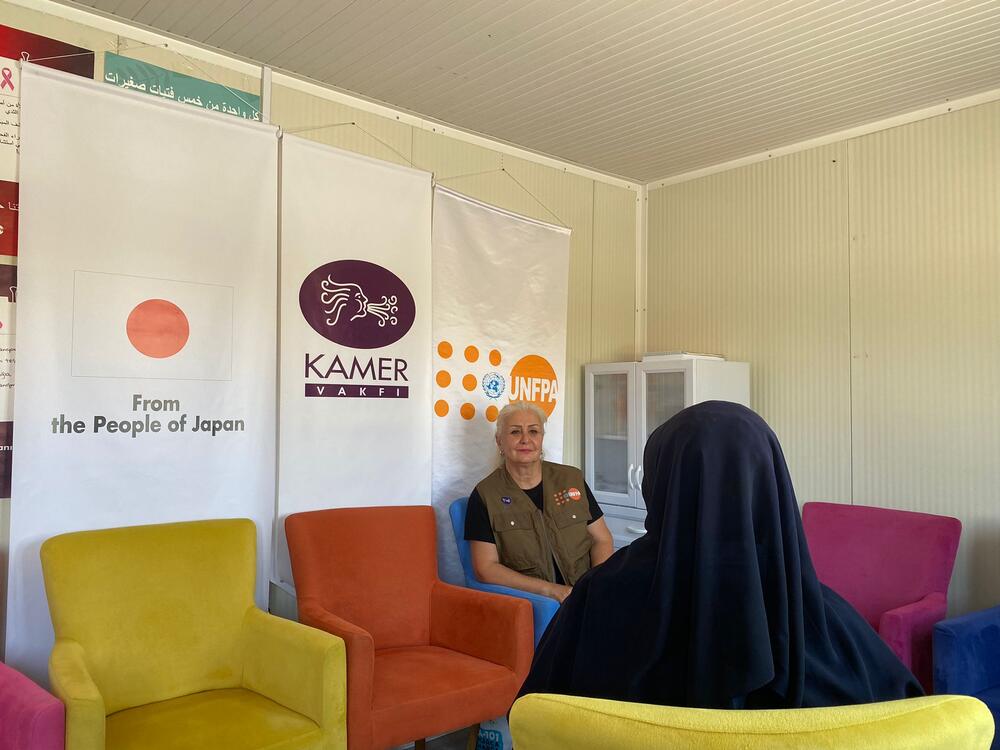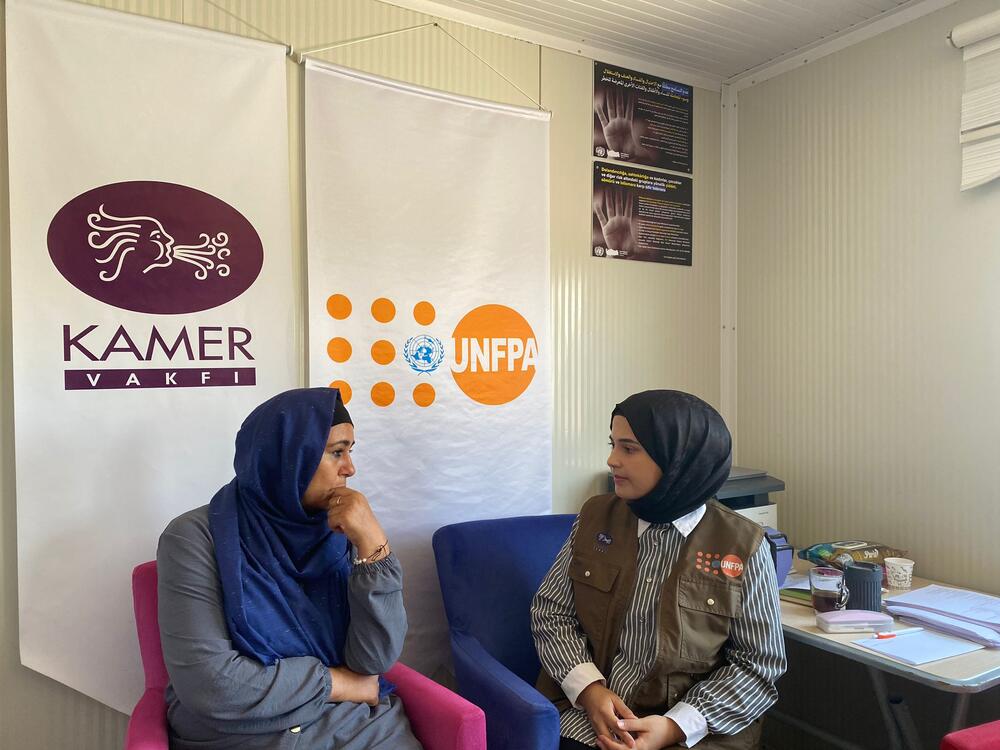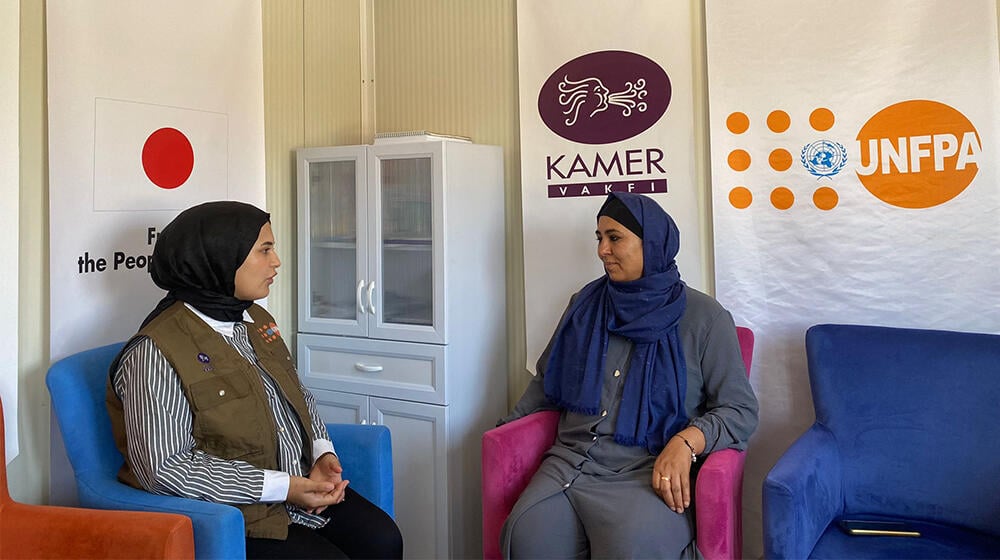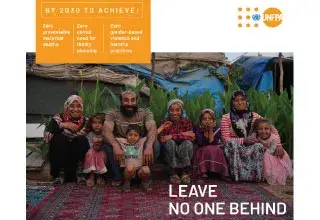The 6 February 2023 earthquakes that affected 11 provinces in Türkiye disrupted the lives of millions of people. Women and girls are disproportionately affected by the earthquake and its fallout, their needs for protection increase due to the difficult conditions in the region, and they have difficulty accessing reproductive health services, supplies and information. United Nations Population Fund (UNFPA), with the cooperation of the KAMER Foundation and the financial support of the Government of Japan, is working at Women and Girls Safe Space to address violence against women; support reproductive health and protection, including cash assistance to help them break free from the cycle of violence; eliminate child, early and forced marriages; and increase access to information and services in the field of reproductive health. Women who continue to recover tell more.
Malatya, Türkiye - The earthquakes of February 6, 2023, which killed more than 53 thousand people, directly affected the lives of more than 9 million people living in 11 provinces of Türkiye. The devastating impact of the disaster on the economy, infrastructure, health and education has caused great difficulties in the lives of everyone in the region. However, women and girls need more support due to the increased risks of child, early and forced marriage, violence, and abuse under these difficult conditions. United Nations Population Fund (UNFPA), is working in Malatya to meet the ongoing needs of women and girls in the areas of health and protection following the earthquake in collaboration with KAMER and with financial support from the Government of Japan.

Gamze’s story
“My children will now have a peaceful home. No one will ever be able to take our roof away from us anymore, no one will ever be able to say, get out of this house.” says Gamze (38), while she tells us about the moment she realized that she was not alone and helpless in the face of any problem in life, and that there was always a way out.
The woman, who was married off to her relative when she was 17 and subjected to violence from her husband for 22 years, says that the only thing that changed for her and her children before and after the earthquake was the extent and frequency of the violence her husband exercised; “My husband was working but he was not providing our family at all. I raised my children with the support of the neighbors. The day I started working to make ends meet, my husband threw me out of the house and said, ‘You can never enter this house again.’”
After Gamze was thrown out of the house, her children were placed in a child home because the violence they were subjected to by their father continued. Gamze applied to UNFPA and KAMER center to get her children out of the child home and reunite with them. With the cash support she received, she was able to rent a house for herself and take her children with her. She hired a lawyer and filed a lawsuit to get herself and her children out of this cycle of violence.
Explaining the importance of the support she received, Gamze says, “This support is like going from a dark place to light,” and adds, “This support has given me great strength. This is an invaluable opportunity not only for me, but also for the future of my children.”

Hilal’s story
Hilal (38) had been subjected to psychological, sexual and physical violence by her husband, whom she has been married to for 16 years. She says that she was afraid to fight back, “Once I went to the hospital to get a medical report, but I thought about my children and went back without going in.”
Hilal learned about the UNFPA-supported Woman and Girls Safe Space when she went to Malatya to get away from her husband because the violence continued after the February 6 earthquakes. She explains the first day she attended the meetings, “Women were talking about their problems. It was my turn, I started crying before I could say a word, and then I started telling. I felt relieved as I told them, I told more as I saw that they were listening to me and I went to every meeting after that. I never stopped.”
Hilal says that she realized how widespread the violence she experienced was when she came to the center, and adds that she recovered and was able to pay for her children’s education and lawyer’s fees thanks to the meetings, trainings, psychological support, dignity kits and cash assistance; “Until I went to the first meeting at the center, I thought that all of this was happening only to me in Türkiye. What gave me the most strength in the face of what I was going through was the existence of this center that stood by women.”

Heyfa’s story
Heyfa (43), who left her home due to the civil war in Syria and came to Türkiye in 2014, describes her experiences during the February 6 earthquake, saying, “I lived the war again on the days of the earthquake.” The woman who currently lives in a container city in Malatya with her four children, says that she misses silence the most.
The woman, who says that she changed her perception that violence from her husband was normal thanks to the training she received at the UNFPA and KAMER centers, says, “When they asked me how I was feeling and my needs as a woman, I understood that I was not alone, I felt like someone was there for me.”
Heyfa, who received psychosocial support and cash assistance from the center, as well as information and services on family planning, explains how the support she received strengthened her, “When a woman is educated and has a job, she can defend all her rights. Therefore, such centers and services should be expanded.”
The stories of women living in Malatya shed light not only on their personal struggles, but also on the common problems experienced by many women living in the earthquake region. To contribute to the solution of these problems, UNFPA continues to provide reproductive health and gender-based violence prevention and response services through Women and Girls Safe Space with the financial support of the Japanese Government and in partnership with KAMER Foundation.
UNFPA, with the support of its partners and donors, has been on the ground since the first day of the disaster. It continues to contribute to eliminating all forms of violence against women, increasing access to health services, empowering women and ensuring equal rights.





